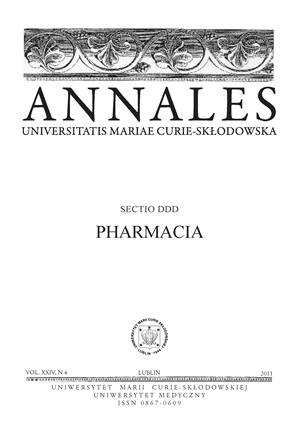May peripheral blood hemoglobin concentration be a prognostic factor among patients diagnosed with metastatic clear cell renal carcinoma treated with targeted therapies?
DOI:
https://doi.org/10.12923/Keywords:
metastatic clear cell renal carcinoma, targeted therapies, anemia, prognostic factorsAbstract
Molecular targeted agents that are registered for the treatment of metastatic clear cell renal carcinoma significantly improved prognosis of patients with such diagnosis. Because the treatment costs are high, the problem of predicting the response to applied therapy and objective estimation of patient prognosis seems to be very important at present. The aim of the current study was the evaluation of peripheral blood hemoglobin concentration – parameter measured on different stages of treatment, as a prognostic factor. The analysis that was performed revealed that hemoglobin level may be useful in determining prognosis among patients diagnosed with metastatic clear cell renal carcinoma. Measurements performed before beginning of targeted therapy as well as after its termination seem to have prognostic value.
References
1. Bamias A. et al: Prognostic stratification of patients with advanced renal cell carcinoma treated with sunitinib: comparison with the Memorial Sloan-Kettering prognostic factors model. BMC Cancer, 10, 45, 2010
2. Bono P. et al: Hypertension as predictor of sunitinib treatment outcome in metastatic renal cell carcinoma. Acta Oncol., 50, 569, 2011
3. Escudier B. et al: Bevacizumab plus interferon alfa-2a for treatment of metastatic renal cell carcinoma: a randomised, double-blind phase III trial. Lancet, 370, 2103, 2007
4. Fernández Gómez J.M. et al: Significance of anemia as an independent prognostic factor in patients with renal cell carcinoma. Med. Clin. (Barc.), 133, 407, 2009
5. Fisher R.I., Rosenberg S.A., Fyfe G.: Long-term survival update for high-dose recombinant interleukin-2 in patients with renal cell carcinoma. Cancer J. Sci. Am., 6 Suppl. 1, 55, 2000
6. Heng D. et al: Prognostic Factors for Overall Survival in Patients With Metastatic Renal Cell Carcinoma Treated With Vascular Endothelial Growth Factor–Targeted Agents: Results From a Large, Multicenter Study. J. Clin. Oncol., 27, 5794, 2009
7. Hudes G. et al: Temsirolimus, interferon alfa, or both for advanced renal-cell carcinoma. N. Engl. J. Med., 356, 2271, 2007
8. Medical Research Council Renal Cancer Collaborators: Interferon-alpha and survival in metastatic renal carcinoma: early results of a randomised controlled trial. Lancet, 353, 14, 1999
9. Motzer R., Bander N.H., Nanus D.M.: Renal-cell carcinoma. N. Engl. J. Med., 335, 865, 1996
10. Motzer R. et al: Survival and prognostic stratification of 670 patients with advanced renal cell carcinoma. J. Clin. Oncol., 17, 2530, 1999
11. Motzer R. et al: Interferon- alfa as a comparative treatment for clinical trials of new therapies against advanced renal cell carcinoma. J. Clin. Oncol., 20, 289, 2002
12. Motzer R. et al: Sunitinib versus interferon alfa in metastatic renal-cell carcinoma. N. Engl. J. Med., 356, 115, 2007
13. Motzer R. et al: Phase 3 Trial of Everolimus for Metastatic Renal Cell Carcinoma. Cancer, 116, 4256, 2010
14. Patil S. et al: Prognostic factors for progression-free and overall survival with sunitinib targeted therapy and with cytokine as first-line therapy in patients with metastatic renal cell carcinoma. Ann. Oncol., 22, 295, 2011
15. Riesenbeck L.M. et al: Hypothyroidism correlates with a better prognosis in metastatic renal cancer patients treated with sorafenib or sunitinib. World J. Urol., 29, 807, 2011
16. Rini B.I. et al: Clinical response to therapy targeted at vascular endothelial growth factor in metastatic renal cell carcinoma: impact of patient characteristics and Von Hippel-Lindau gene status. BJU Int., 98,756, 2006
17. Sunela K.L., Kataja M.J., Kellokumpu-Lehtinen P.L.: Changes in symptoms of renal cell carcinoma over four decades. BJU Int., 106, 649, 2010
18. Therasse P. et al: New guidelines to evaluate the response to treatment in solid tumors. European Organization for Research and Treatment of Cancer, National Cancer Institute of the United States, National Cancer Institute of Canada. J. Natl. Cancer Inst., 92, 205, 2000
19. Yates J.W., Chalmer B., McKegney F.P.: Evaluation of patients with advanced cancer using the Karnofsky performance status. Cancer, 45, 2220, 1980
Downloads
Published
Issue
Section
License
Copyright (c) 2011 Authors

This work is licensed under a Creative Commons Attribution-NonCommercial-NoDerivatives 3.0 Unported License.


